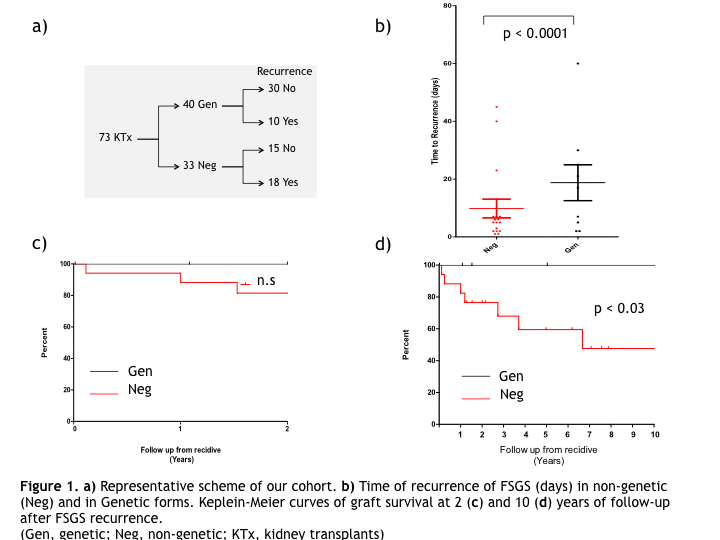Possible Recurrence Must Not Limit Kidney Transplantations for Patients with Focal Segmental Glomerulosclerosis
Istituto Giannina Gaslini, Genova, Italy
Meeting: 2022 American Transplant Congress
Abstract number: 502
Keywords: Genomics, Glomerulonephritis, Graft survival, Recurrence
Topic: Clinical Science » Kidney » 49 - Recurrent Kidney Disease & Genetics
Session Information
Session Name: Recurrent Kidney Disease & Genetics
Session Type: Rapid Fire Oral Abstract
Date: Tuesday, June 7, 2022
Session Time: 5:30pm-7:00pm
 Presentation Time: 6:00pm-6:10pm
Presentation Time: 6:00pm-6:10pm
Location: Hynes Room 310
*Purpose: Non-genetic forms of Focal Segmental Glomerulosclerosis (FSGS) are at high risk of recurrence after kidney transplant (KT) (55%), when compared to inherited forms (0-4%) [1]. However, reports are restricted to small case series, with limited data on genetic forms [1]. Moreover, data on graft survival, also comparing genetic and non-genetic forms, are generally missing.
*Methods: We described 73 pediatric subjects (2-18yrs) with histological diagnosis of FSGS, followed at our Unit and receiving KTs between Jan 1998 and Sep 2021. All subjects had a genetic investigation based on the assays available at the time of the diagnosis. Negatives for Sanger, received confirmatory analysis in NGS, once available. All variants were classified according to the American College Genetics and Genomics and patients were divided in genetic and not.
*Results: Genetic diagnosis with different genetic forms for FSGS was in 40/73 (55%), recurrence in 10/40 (25%) vs. 18/33 (55%) recurrence in non-genetic forms (Fig1A). The mean time of relapse was significatively shorter in non-genetic than genetic (10 vs. 18 days; p< 0.0001) (Fig1B). At 2yrs of follow-up after recurrence, we observed lost of graft in 3/18 non-genetic FSGS vs. none in genetic patients (Fig1C). At 10yrs, graft survival was 55% (median 7.5 years) for non genetic vs. 100% in genetic (Fig1D). Therapy of genetic forms consist of PEX; non-genetic received PEX and anti-CD20 antibodies.
*Conclusions: We report for the first time a follow-up analysis of genetic vs. non-genetic FSGS receiving KT, describing a relevant overall graft survival at 2 and 10yrs of follow up after recurrence. Compared to previous findings, incidence of recurrence after KT for genetic FSGS is of relevance (25%), with positive outcome. To our knowledge, this is the largest nonregistry-based cohort of this patient population. Our findings reinforce the needing to support KT for FSGS, included living donor programs.
To cite this abstract in AMA style:
Angeletti A, Gentile M, Ghiggeri G, Bruschi M, Lugani F, Caridi G. Possible Recurrence Must Not Limit Kidney Transplantations for Patients with Focal Segmental Glomerulosclerosis [abstract]. Am J Transplant. 2022; 22 (suppl 3). https://atcmeetingabstracts.com/abstract/possible-recurrence-must-not-limit-kidney-transplantations-for-patients-with-focal-segmental-glomerulosclerosis/. Accessed February 25, 2026.« Back to 2022 American Transplant Congress

